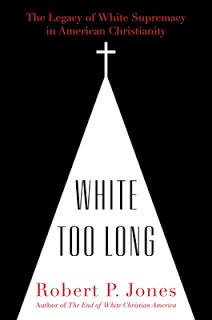
New interviews with Robert P. Jones keep coming along after the recent publication of his book White Too Long: The Legacy of White Supremacy in American Christianity, about which I blogged a number of days ago. New interviews and commentary about the book, to which I will keep pointing you as I spot these pieces ….
Here are several new pieces to which I'd like to draw your attention:
Francis Wilkinson, "The Theological Roots of White Supremacy," in which Jones states,
Much of the recorded history of slavery, segregation, and racism gives scant treatment to the integral, active role that white Christian leaders, institutions, and laypeople played in constructing, maintaining and protecting white supremacy in their communities. ...
At a pragmatic level, white churches served as connective tissue that brought together leaders from other social realms to coordinate a campaign of massive resistance to Black demands for equality. At a deeper level, white churches were the institutions of ultimate legitimization, where white supremacy was divinely justified via a carefully cultivated Christian theology. White Christian churches composed the cultural score that made white supremacy sing.
Jennifer Rubin, "How white supremacy infected Christianity and the Republican Party," in which Jones says,
I think the phrases "family values" and "values voters" were one of the most successful, durable — and disingenuous — political branding operations in my lifetime. This identity foregrounded opposition to abortion and same-sex marriage along with an insistence that a candidate’s character was central to their qualifications for office. But it never really held together in the way that the rhetoric implied. When the Roe v. Wade decision legalizing abortion came down, for example, the Southern Baptist Convention supported it, largely considering it a "Catholic issue. Opposition to same-sex marriage, despite being broadly declared a hill to die on just a decade ago, has largely been dropped as a political wedge issue, as two-thirds of Americans — along with a majority of younger Republicans — have come to support marriage equality. And in more than a decade of doing public opinion research, I’ve never seen a public opinion survey where White conservative Christians ranked abortion or same-sex marriage among their top three voting issues.
Most tellingly, Trump’s ascendancy has snuffed out the White Christian character and virtue industry, at least as these ideals apply to our political leaders. One jaw-dropping statistic: In 2011, only 3 in 10 White evangelicals said that it was possible for a political leader to commit immoral acts in his or her private life and still be able to fulfill their duties in their public life; by 2016, with Trump at the top of the ticket, 72 percent of White evangelicals had decided this was no longer a problem.
The one enduring, animating issue that fueled white flight from the Democratic Party to the Republican Party has been civil rights for African Americans. This was the issue that originally pulled Jerry Falwell Sr. out from behind the pulpit and into organizing the Christian right political movement. This white-supremacist undercurrent, tied to White Christian identity, is the key to understanding our current political polarization and the transformation of our two political parties over the last few decades.
Diane Rehm, "Confronting A History Of White Supremacy In American Christianity":
Diane Rehm asks,
What about white people who think of themselves as people who hold good and warm feelings aobut Black people, but you're saying that nevertheless, that somehow they continue to associate with white Christianity which has inherent this feeling of white supremacy.
Robert P. Jones responds,
It's one of the, I think, more perplexing things to see in the data. At the same time, we see, when we ask people, "How warmly do you feel toward African Americans -- that's a fairly straightforward question -- we get across the board people saying very warm. So to take white evangelicals, the group in which I grew up, that group is the most likely to say out of other christian groups that they hold warm feelings toward African Americans.
But when we measure their their views across these fifteen questions that I use in the book on what I call the Racism Index, fifteen different questions about attitudes about race oand structural racism, they actually score the highest on that index.
So simultaneously saying, "I feel the most warmly toward African Americans," and at the same time scoring fairly high on this Racism Index, and I think that's the dilemma we're in that, many white Christians are so inside of a world that they've inherited, that they just don't see it. And one of the things that I hope the book will do is actually start some more critical conversations where we get beyond, "Well, do I feel personal prejudice toward someone who's African American," and more about, "How do I understand my own history? How do I understand the history of my own church? And how do I understand my place in that and its role in perpetuating and even legitimizing the kinds of inequalities that we see all around us today?
Michael Gerson, "The White, European Jesus of Western imagination is fiction":
The white, European Jesus of Western imagination is a fiction produced by those who could not imagine human perfection in any other form. “Whites simply couldn’t conceive of owing their salvation to a representative of what they considered an inferior race,” Robert P. Jones, chief executive of PRRI and the author of "White Too Long: The Legacy of White Supremacy in American Christianity" emailed me. "And a nonwhite Jesus would render impossible the intimate relationalism necessary for the evangelical paradigm to function: no proper white Christian would let a brown man come into their hearts or submit themselves to be a disciple of a swarthy Semite."

